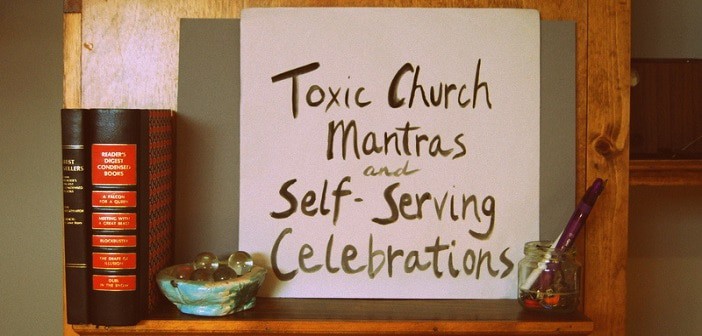Is the language of the culture within your church toxic to people living in the culture outside it?
I’ve been trying to write this for a while now. I keep starting over. I’m sensitive to the fact that this is going to bring specific churches to your mind as bad examples. My goal is not to shame anyone; I certainly won’t name them, but I believe this matters.
What I’m not talking about is the “church people” we see in news clips holding venomous posters on the side of the road. That’s clearly toxic. What I am talking about is more subtle: church t-shirts that sell an exclusive membership. Or, rally cries intended to foster community within one church that instead suggest competition between churches. Or, insider language decorating an Instagram post without regard for how it may be interpreted in a public context.
Here’s an example:
I recently watched a church video about one student’s journey to Christ. It was meant to share this student’s story and promote the impact of the church’s student ministry program. The story angle leaned towards how the church filled the gap because this student’s parents didn’t attend church. She loved her parents but since they didn’t know Jesus, she couldn’t share her spiritual journey with them.
Naturally, the “testimony” video was shared in every weekend service and on the church’s social media feeds.
If you watch the video from the viewpoint of a church attendee or student ministry stakeholder, it was worth celebrating. But, what about the girl’s parents? How do you think they felt when the video showed up on Facebook? It might make you cringe if you think of their highly personal family “disconnect” being publicly broadcast to their neighbors, friends, co-workers, extended family. It might hurt and make you sad to see your child talking to a camera about things she feels she can’t discuss with you; and then shared all over social media. You might feel villainized by that church.
Here are some other examples of less than thoughtful public communication I see many churches use:
- Pastors saying they think their church is the best. I understand they’re trying to communicate to their people that they love them and don’t want to be anywhere else. But from the outside? It makes Jesus’ church sound divided and competitive.
- Posting on divisive issues. Just because it’s true, doesn’t mean your approach is right. Truth is best heard in the context of relationship, not tossed from a distance on social media.
- Talking about “lost people.” Did you think of yourself as lost before you came to Christ? Would you have been drawn to people who offhandedly told you that you were? Labels and categories push people away instead of drawing them in.
We say things outside our church walls that take on new meaning. We all need to get better at evaluating our language. I’d ask you to stop to think about your church, not anybody else’s. What words and mantras are you using, and in what contexts, that might mean something different than what you intend?
Two challenges for you:
-
Add these two questions to your editing process for everything that will be shared outside your four walls.
-
What’s the likely reach?
Just because your Facebook page is “Liked” by your church members doesn’t mean the things you post are private to them. Many things they comment on or share will reach far beyond your church’s members. That’s a great thing if you are arming them with content that you have specifically designed to be outsider-focused! But if not…
-
How might an outsider interpret this?
Their interpretation is what matters, not whether or not you’re actually correct. Being correct is useless if it prevents or destroys relationship. Force yourself to ask this question regularly. As you build the habit, you’ll notice how small shifts to words can change a message from alienating to inviting.
-
-
Find some outside editors.
At least once per quarter, ask a few unchurched people to review your website, bulletin, t-shirts, social media posts — anything you’re putting out into the community — and give you their gut reactions. And don’t get defensive. Just listen.
Political correctness isn’t the goal. We all have a tendency towards insider-language, regardless of the size of the church. If you want to communicate to outsiders that your church welcomes them, you need to understand how your insider language is heard.






